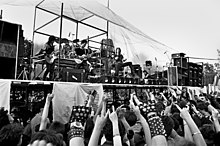Roko maršas





Roko maršas (The March of Rock) was a rock music festival, organized in various cities of Lithuania. It was held in 1987–1989. It was resurrected in 1996 and 1997. The first festivals were organized while Lithuania was still under the Soviet occupation. They became part of the Singing Revolution, spreading ideas of the Lithuanian independence movement among the youth. It helped to awaken the younger generation from Soviet-era apathy and inspire them.[1] In total, the three first festivals attracted an estimated 130,000 spectators.[2] The festivals became a rehearsal for the mass protest rallies by the Sąjūdis that lead to the restoration of Lithuania's independence in March 1990.[3]
The idea for the festival was raised by Algirdas Kaušpėdas, leader of the band Antis, after a successful concert Kažkas atsitiko (Something Happened) in 1986. The event encouraged various underground bands to become public. The festival toured cities in Lithuania. The first installment in 1987 focused more on music without an obvious political message while later installments had clear political agendas.[3]
Festivals
[edit]| Year | Performers[3] | Locations | Notes |
|---|---|---|---|
| 1987 |
|
Started July 6. Vilnius (Kalnai Park), Kaunas, Tauragė, Kėdainiai, Šiauliai, Klaipėda | |
| 1988 | The performers openly displayed the flag of Lithuania. Performances were accompanied by speeches by Arvydas Juozaitis and others on mainly environmental issues. The speeches also touched upon more sensitive political topics, such as the Soviet deportations from Lithuania.[4] | ||
| 1989 |
|
The performances were accompanied by political speeches that demanded withdrawal of Red Army troops and liquidation of other Soviet military objects in Lithuania. The speakers also discussed the Molotov–Ribbentrop Pact.[2]
The first Foje album, Geltoni krantai (Yellow shores), was distributed during this festival. Released the disc Roko maršas per Lietuvą '89 (Rock march through Lithuania '89) which contained the following songs: Aš gimsiu rytoj (I Will Be Born Tomorrow) by Foje, Lietuva yra OK (Lithuania Is OK) and Ašarėlė (Little Tear) by Naujas kraujas, Kodėl? (Why?), Kaime (In A Village), and Kareivėli ([To] Little Soldier) by Edis Punkris Band, Aš žinau (I Know) and Tik po audros (Only After Storm) by Dainava, Lietuvos valstybė (State of Lithuania) by Antis.[3] | |
| 1996 |
|
|
This installment promoted civic participation and involvement in the social problems with the slogan "Mums ne vis vien" (It's not all the same for us). Antis made special appearance even though the band disbanded in 1990.[5] |
| 1997 |
|
The final concert in Vingis Park, Vilnius. Other concerts included performances in Ukmergė (Culture House) and Pravieniškės prison (Spitfire and Dr. Green). |
References
[edit]- ^ Savukynas, Virgilijus (2007). "Lithuanian and Europe: Possibilities for Reconstructing Identity". In Savicka, Aida (ed.). Lithuanian Identity and Values. CRVP. p. 41. ISBN 9781565182363.
- ^ a b c Kuklytė, Birutė (2008). "Roko maršai per Lietuvą 1987–1989 m. Žvilgsnis į Dainuojančią revoliuciją". Genocidas ir rezistencija (in Lithuanian). 23. ISSN 1392-3463.
- ^ a b c d Paleckis, Mindaugas, ed. (2011). Lietuvos rokas: ištakos ir raida (in Lithuanian). Vilnius: Mintis. pp. 181–183. ISBN 978-5-417-01030-9.
- ^ a b Raudonytė, Diana (2011). Žaliųjų sąjūdis Lietuvoje 1987-1992 m. (Master's) (in Lithuanian). Vytautas Magnus University. pp. 35–36.
- ^ Paleckis, Mindaugas, ed. (2011). Lietuvos rokas: ištakos ir raida (in Lithuanian). Vilnius: Mintis. p. 208. ISBN 978-5-417-01030-9.
